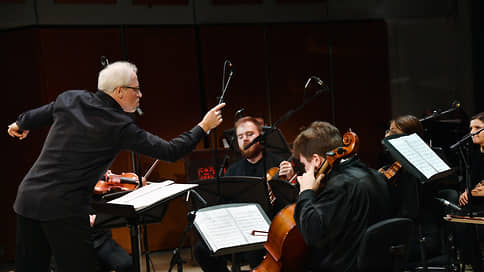Mahler and new music at GES-2
[ad_1]

The concert season at GES-2 opened with Gustav Mahler’s Fourth Symphony (1901), not in the original, but in a transcription for chamber ensemble (1921). A hundred years later, as part of the cycle “Repairing Old Ships,” Mahler was accompanied by the rising star of the European composer scene, Daria Maminova, and did not shy away. Tells Yulia Bederova.
The “Repair of Old Ships” series, dedicated to old and new music, recalls one of the past breakthrough projects of GES-2: just like the “Settings-3” installation in the 2022/23 season, it appeals to the experience of the legendary “Society of Private Musical Performances” ” Established by Arnold Schoenberg in Vienna in 1918, it was engaged in the production and promotion of the latest music, but not for the masses, but, on the contrary, for a narrow, enlightened audience. “Critics not allowed,” read the sign above the entrance to the collection of aesthetic innovators who were their own listeners, creators, and critics. Criticism – in musical forms – was, in essence, a significant part of the art presented, and both premieres and transcriptions of famous scores were performed.
The transcription of Mahler’s Fourth Symphony, made for the Society by the Schoenbergian Erwin Stein, is just such a critical analysis and reassembly of the outgoing romantic tradition. Considering that the original itself was written as a semi-nostalgic, semi-ironic, partly bright, partly eerie critical homage to the classical-romantic era, and the composer chose the text of the “cozy” (according to Mahler’s remark) song “Heavenly Life” about happiness in the afterlife for the symphony from the folklore collection “The Boy’s Magic Horn,” which is structured in many ways as a romantic hoax, it turns out that Stein’s brilliant work is already at least the third level of critical analysis within the framework of one work. The next level is created by performing interpretations.
One of the iconic interpretations was performed in 2020 at the Berlin Philharmonic with Kirill Petrenko. It was a pandemic performance without an audience. The choice of the version, in which Stein transforms Mahler’s cosmos into a chamber-like modernist universe, was formally dictated by restrictions on the number of people on stage. And the song about heaven, where angels bake bread for dead children and saints accompany dances, became a viral hit on Covid YouTube.
The current performance in Russia, taking into account the inaccessibility of musical material, among other things, looks like an even greater feat. However, there was no muscular effort or pretentious strain in him. In a phenomenally sensitive, subtle, graphic and emotionally careful performance by the Speech Quartet (first violin Vladislav Pesin) and eight other musicians known from the works of the Musicaeterna orchestra, soprano Elena Gvritishvili with her plastic sound management and nuances of colors, the smartest conductor Fyodor Lednev and sound engineer Sergei Kochetkov ( in new spaces and programs of old music, sound engineering becomes the same integral element as in new scores) the beauty of the symphony was in excess, but without redundancy. It sounded that florid simplicity that Mahler was a master of, and that crystalline complexity that Stein heard, and acute sadness, and unkind humor that Mahler and Stein together fit into a compact porcelain, ringing form.
In the ghostly movement of the first movement, in the desperate texture of the scherzo, in the soaring tenderness of the third, in the grace of the final song of the symphony, “carefully” (Mahler’s remark again) turned equally to the past and the future and played in the same way, one could hear the ringing of alarm bells not either from Schubert’s past or from Stravinsky’s future, it pierces the music through and through. And between 1901 (the year of the premiere of the score on the verge of two centuries), 1920 (the year of creation of the transcription between the two wars) and 2023 in Moscow, as if living between happening and non-existent events, an imprecise, but clearly felt arch is established.
Another is built by the concert cycle itself, with a title borrowed from Stravinsky, repairing the ships of old music to launch them on the waters of modern art along with the ships and rafts of the latest scores, such as “I don’t know whether the Earth is spinning or not” for female voice and ensemble Daria Maminova to Khlebnikov’s poems. Her amazing, fragile and tenacious acoustic world is complex, but cozy, the song inside it seems to be spinning, then not, until it slides with funny and scary baby talk into silence, as if into a funnel of time. From this silence, Mahler emerged in the concert, and in the future works by Stravinsky, Beethoven, Bach, Yuri Krasavin, Luigi Nono, Victor Ekimovsky, Alexander Rabinovich-Barakovsky and other authors of the 21st century will appear.
[ad_2]
Source link






